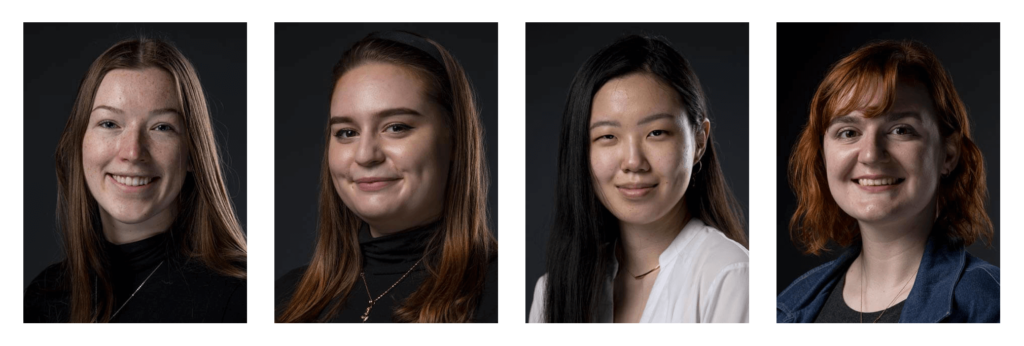New cohort of McGillicuddy Humanities Center Fellows begin research
Four University of Maine students have joined the Clement and Linda McGillicuddy Humanities Center (MHC) this semester as research fellows.
Fellows receive $4,000 a semester for two consecutive semesters while they work on their chosen humanities projects and serve as humanities ambassadors to peers, the campus and beyond.
Delaney Burns, Elizabeth Dalton, Grace Royle and Haley Santerre join existing fellows Nolan Altvater, Hailey Cedor, Nola Prevost and Katherine Reardon, who will finish their research at the MHC in spring 2021.

Incoming fellow Burns is exploring the intersection of art and science. Burns, a fourth-year student from Gorham, Maine, is double-majoring in studio art and marketing with minors in art history and graphic design. For her fellowship, Burns will create a series of large-scale wood block prints titled “Pinus Iongaeva: Discovering Form and Value through Ancient Bristlecone Pine Trees.” She hopes to learn and share new printmaking techniques, understand more about ancient bristlecone pine trees and their importance to the ecosystem, and explore their personal connection to her father, a UMaine Forestry graduate.
Dalton has begun researching her project “Analyzing the Harmful Effects of Historical Inaccuracies in Medieval History as Seen in Popular Culture.” A third-year history major from Lamoine, Maine, Dalton is minoring in medieval and renaissance studies. While recognizing the potential that binge-worthy shows and popular movies have to engage the public with history, Dalton’s project will investigate and describe the problematic ways in which accuracy is overlooked for the sake of entertainment. Her fellowship research will focus on depictions of the medieval age in Netflix’s “The King.”
Royle is a third-year communication major and legal studies minor from Minot, Maine. Royle has begun work on a scholarly paper tentatively titled “From Self-Help to Self-Harm: An Analysis of the Dangers that Fester in the Self-Help Industry.” She is particularly interested in exploring the hidden dangers of the industry, with self-proclaimed “gurus” practicing without certification or sufficient qualifications or regulation. Her research will also look into the complicated psychology that comes into play, where people are being promised self-help but are instead partaking in dangerous, self-harming activities.
Incoming fellow Santerre asks “Are the Gods to Blame?” Santerre is a third-year studio art major and art history minor from Portland, Maine. She is creating a series of six paintings that examine recent catastrophic events, such as the coronavirus pandemic or Australian wildfires, through a historical and theological lens. By examining how ancient cultures, particularly those in Greece, would have responded, she hopes in turn to learn more about peoples’ beliefs today. Haley is the inaugural Richard Karin Anderson Undergraduate Fellow. Richard and Karin Anderson provide generous donations that fund the research of one fellow per year.
More information will soon be announced about a two-part showcase event in April featuring the research of the four fellows completing their research this spring. Altvater, a future tribal educator, research project is “Decolonizing Maine Education: Creating an Educational Resource to Improve the Implementation of The Wabanaki Studies Law.” Fellow Cedor is completing research related to local involvement of Lithuanians in the Holocaust and how it currently informs national views and identity in relation to that horrific moment in time. Fellow Prevost is interested in the historic use of fairy tales to represent societal issues or moral messages. She has been using fairy tale conventions and feminist scholarship to create her own modernized collection of fables. Lastly, fellow Reardon is putting final edits on her work, “Family Stories, The Truth, and How It Shape Us,” which examines family lore and storytelling within her own Irish family.
The MHC funds a rotating cohort of eight undergraduate fellows, providing $4,000 each per semester for two semesters to complete the research or creative projects of their choosing. Many past MHC fellows have earned a graduate degree at UMaine.
Students interested in becoming a MHC undergraduate fellow have two deadlines to apply each year. The deadline for proposals for the fall 2021–spring 2022 cohort is March 17. Research and creative work of all types across the humanities will be considered including academic papers,art gallery shows, community workshops and educational video series. While the project has to be centered in the humanities, students from other disciplines are welcome to submit proposals for humanities-based projects. Students must be in their junior or senior year during the length of the two-semester fellowship term.
More information, including application instructions, proposal guidelines and a rubric, are available online or by contacting the MHC’s humanities specialist Karen Sieber at karen.sieber@maine.edu.
